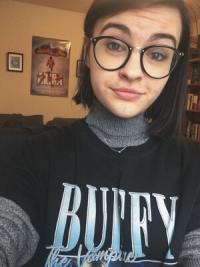Rachel the Vampire Scholar

Who doesn’t love a good vampire story? From Twilight to Buffy the Vampire Slayer to Vampire Diaries, vampire narratives have shaped contemporary popular culture. The impact has been so far reaching that Professor Karen Winstead has a unit on vampires in her course about monsters, and an entirely separate course (English 3364: Special Topics in Popular Culture) dedicated to them as well.

That is where MA/PhD student Rachel Stewart found her research interest. After graduating with her B.A. in English Literature from Ohio State in 2020, Stewart returned to the department to begin the MA/PhD program and pursue academic research on the horror genre and its pop-culture roots in nineteenth-century literature. But her specialization lies in vampire literature. She studies the vampiric elements in fiction that do not contain explicit vampires, expanding theoretical understandings of the creature to include psychic vampires and trauma as vampiric. She has also done considerable research to bring under-studied horror authors and works back into academic discussions, especially Florence Marryat.
When asked about her initial interest in vampires, she replied, “It's funny, actually, because I used to really hate horror--movies, specifically. However, the show that I grew up watching endlessly was The X-Files, and I was a voracious reader who ate up supernatural fiction in general. I think my love for vampires, specifically, came with the series The Morganville Vampires by Rachel Caine that came out right around the same time as Twilight. There are 16 novels in the series and I've read them all more times than I can count. From there, I jumped to "classics" such as Twilight, The Vampire Academy, and The Vampire Diaries. Soon, if it didn't have a vampire in it, I wasn't interested. It wasn't until further research into my now primary period of study--the Victorian period--that I also developed a huge love for the ghost and haunted house tale. But I'll always be a monster lover first and foremost.”
As we spoke about her research interest in the topic, she talked about her hesitancy in the beginning. “I had always loved vampires but saw it as just an unimportant interest and not something I could take seriously until we did our vampires unit in Dr. Karen Winstead's course on monsters my early years of undergrad. There, I saw that there were these super smart and passionate people in academia working on the thing I loved the most, and I realized I have things to contribute to that conversation. Before that, I definitely only saw vampires as my ‘guilty pleasure’ and thought I had to be a ‘good English major’ who was only interested in ‘real literature’ like Shakespeare or Dickens (full disclosure--I did come to love Dickens, especially Bleak House which features a vampire!!).”
Stewart went on to be a Teaching Assistant for English 3364 in Fall 2021. She found teaching a class that was an important part of her undergraduate career “amazing, truly a "seeing behind the curtain" moment. “The class had changed a lot since I had taken it, and many of the new book additions on the syllabus were because I had recommended them to Karen, which was super cool. I loved returning to these familiar texts and working with Karen to see how we could best teach them--especially while I was teaching an English 1110 course centered on vampires at the time, myself. It also made me very sentimental, as that class was where this all started, and I truly do not think I would be in graduate school studying what I do if not for taking that course.”
She credits her research interest as being instrumental in her decision about graduate school and work. “I always say that graduate school is for people unhealthily obsessed with one, very specific thing, and want to get paid to just never shut up about that thing--only partially a hyperbolic statement. Basically, I took Karen's vampire-centric course after the course on monsters and even after it was finished, I wasn't. I had the germ of an idea for something I was interested in exploring further, and Karen suggested I do a senior research thesis on it. I took the dive, did the thesis and just absolutely loved it. Getting so immersed in the topic made me even more passionate and opened up even more questions that I knew this research thesis couldn't be the end of it. So, when I realized graduate school was the perfect opportunity to continue researching, teaching and spreading my passion with others, I knew it was what I wanted to do. And here we are!”
Stewart’s thesis, "De-Fanging the Tradition: An Examination of Psychic Vampires in Literature (1897-2019)",“examined Florence Marryat's The Blood of the Vampire (1897) through the lens of archival recovery and the sympathetic vampire; Tana French's In the Woods (2007) as an example of trauma as a psychic vampire, sucking on ‘cultural life-force' rather than the biological life-force of blood (which I used to develop a ‘vampiric lens’ in order to analyze literature that would not normally be defined as a vampire story); and the first season of the TV show What We Do in the Shadows (2019) to postulate on the future of the psychic vampire and its legacy. In general, my aim was to explore the different ways in which psychic vampires, vampires that do not suck blood, fit into the tradition of vampire literature.”
Stewart is grateful for the support Ohio State has provided her with on this journey. She would like to thank Ohio State Libraries and the English subject librarian, Jen Schnabel, “who provided me with so many incredible opportunities as an undergraduate to share my research--from curating October's horror literature book display, to inviting me to talk on multiple panels at library hosted events. These events were frequently co-hosted by the English department and the English faculty on the panels were always so welcoming and encouraging to a young scholar like myself.”
Stewart went on to say that “the biggest way that the English department supported my research was when they funded my trip to Yale!! I applied for an undergraduate research grant in order to do research with the Florence Marryat Collection at Yale's Beinecke Rare Books and Manuscripts Library for my senior thesis, and [the Ohio State English department] funded the entirety of my trip. I still count that trip as one of the best experiences of my life and hold it responsible for my eventual decision to focus on the Victorian era in graduate school.”
Here is a list of book recommendations from Rachel with something for everyone:
-
A vampire classic that is not Dracula but came out the same year and follows a bisexual, biracial, psychic vampire — The Blood of the Vampire by Florence Marryat
-
A short graphic novel that you can finish in one sitting, cozied up with coffee or tea — Fangs by Sarah Andersen
-
A book that asks: What if Dracula was not killed and instead started hooking up with Queen Victoria? And what if Jack the Ripper's victims were vampire prostitutes? — Anno Dracula by Kim Newman
-
The start to a delightful paranormal cozy mystery series that follows a young woman who visits her grandma's knitting shop in Oxford only to find out that she is now...undead? And so are her new friends? — The Vampire Knitting Club by Nancy Warren
-
A book set in a world ravaged by a plague that targets children, killing them all suddenly. Then, almost just as suddenly, they are back--but this new life must be sustained through the drinking of blood. — Suffer the Children by Craig DiLouie
